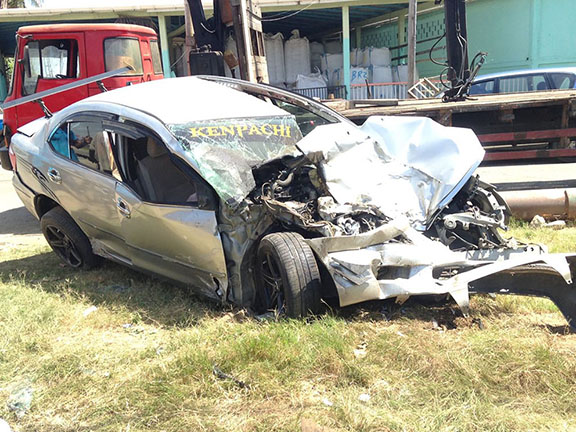Chief Executive Officer of the local training and consultancy firm, Clarke Productions says that his company is seeking to take its Defensive Driving programme beyond next week’s October 31 – December 1, two day programme, pointing out that the recent multi-fatality East Bank tragedy “surely underscores the importance of taking a long hard look at the way in which we use our roads.”
Earlier this week during a briefing session for next week’s inaugural exercise Clarke disclosed that his company will be communicating with the various state and non-state agencies, through Permanent Secretaries, Regional Executive Officers and other public sector officials as well as Business Support Organizations. “While it is thoroughly regrettable that this company’s initiative coincides with a national tragedy on our roads I believe that it is important that we take something meaningful away from this experience. We will be contacting all of those various public and private sector officials urging them to have their drivers, who, incidentally, are among the significant road users, enroll in our Defensive Driving programme. Our experts tell us that it is important that we try to change the culture of road use across the board rather than simply target a handful of people who might be interested.”

Asked to outline the curriculum for the Defensive Driving Course Clarke told Stabroek Business that while the course details will be spelt out by the specialist instructor recruited from the Trinidad and Tobago company JARIC, it was his opinion the programme was essentially “ a good sense, rules of thumb course” that was essentially concerned with accident avoidance. “From what we have learnt defensive driving is about creating a ‘safety first’ mind set which, as we are all aware, is not always present on our roads. I can tell you that our Instructor will be trying to communicate a think-safety-first state of mind that will have to do with drivers being aware of their surroundings, not placing their safety in the hands of other drivers, being aware of their speed, focusing on an escape route from potentially dangerous situations and minimizing distractions. Of course I expect that issues like drinking and driving and driving whilst tired will be a part of its too. For me, learning from the programme will depend as much on the state of mind with which we approach the exercise as on what we take away.
Clarke told Stabroek Business that while negotiations with JARIC for the execution of the programme had predated the Tuesday October 15 Friendship, East Bank two-vehicle collision in which five persons lost their lives, the coincidence has not been lost to the company. “Frankly, I have to admit that since the East Bank tragedy the issue of speed and recklessness on our roads have formed part of the impetus to get the message out there about the need for a heightened emphasis on Defensive Driving.”
Clarke told Stabroek Business that what continues to be the significant numbers of vehicles, including large vehicles, deployed on the roads by both public and private sector agencies had also influenced his company to communicate directly with those agencies. “The truth is that while the blame cannot necessarily be placed at the feet of employers we often find a high incidence of speeding and recklessness by drivers of large vehicles, many if not most of which are owned by private sector entities. While it is not a matter of the managers and owners of those companies being directly responsible, it is to them that we must target the defensive driving message. We believe that our Defensive Driving Programme can help them to set rules which they should require their drivers to follow. Of course, the same thing applies to public sector entities.
Asserting that next week’s exercise is not a “one off” initiative Clarke told Stabroek Business that the company is currently giving consideration to expanding the programme to areas outside of the capital “where, in many instances, the roads are more dangerous and where, quite frequently, there is even less awareness of the virtues of defensive driving.”






